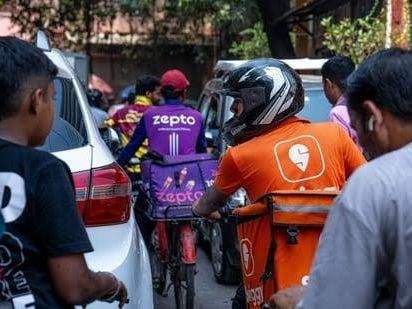India's 10-min delivery boom strains workers, fuels traffic violations in a race against time.
Bangalore, India —The rapid rise of fast commerce in India, led by Swiggy Instamart, Zepto, Blinkit and Zomato, has intensified competition in the grocery delivery space. With the promise of 10-minute delivery, employees are under extreme pressure to meet deadlines, often at the expense of road safety and personal well-being.
Many delivery drivers, struggling with low wages and high fuel costs, are now hiring yulu electric bikes to cut their expenses. However, in the rush to meet tight deadlines, many ride recklessly, weaving through traffic, crossing signals and using footpaths.
“These bikes are slower than petrol bikes, so we have to speed through gaps in traffic just to avoid late fines,” says Rahul Yadav, a delivery partner at Blinkit. “If we miss the time, we get fewer orders and earn less.”
Traffic authorities in Bangalore have seen a 30% rise in offences by delivery drivers, including jumping signals, crossing limits and driving on pavements. Several fatal accidents have also raised alarm bells about the safety of workers in the gig economy.
“We see them breaking rules every day and we stop them, but they are under pressure from the apps,” says Anil Mehta of the Bangalore traffic police.
Delivery companies claim riders are not penalised for delays, but workers argue that the algorithm priorities speed, with faster deliveries leading to better rating and incentives.
Despite growing concerns, concrete safety measures remain absent, leaving India’s delivery riders caught between earning a living and risking their lives.
